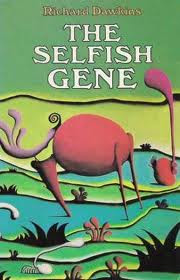
This book made a big splash when it was first published in the 1970s, and it is now in its 3rd edition.
Essentially, the book argues that evolution does not work on a family, group, or species level, but on the level of the gene.
Humanitarian feeling, by this measure, is not occasioned by a desire on the part of humans for humanity to survive, and it is certainly not (perish the thought) occasioned by some higher, non-biological feeling we might have (what! something non-biological, never!).
Dawkins takes us back to the primordial soup in which loose bits and pieces slowly formed molecules. The molecules which survived, were the molecules which were successful. They formed sacs to keep themselves safe, or learnt how to push chemicals away, or whatever. And slowly they developed into full organisms. However, the driver is still those early small organisms, which are now recognisable as DNA. So, for example, the DNA for two legs survived because giving a creatre two legs made that creature more likely to survive and thus produce DNA. We are, in Dawkins view, just robots created by our DNA to carry our DNA around and keep it safe.
I actually find this quite a believable theory. Though, why should we care what I think? I don’t know squat about biology.
He includes a very interesting section on how the basic rule of most religions – do as you would be done by – might have been shaped by evolution. More here if you’re interested.
Dawkins can’t bear religious fundamentalism, which is I find hilarious, because he is such a biological fundamentalist. He is so insistent on the whole nothing-beyond-biology argument, it gets a bit embarrassing. I think insisting loudly that there is not a god is just as silly as insisting loudly that there is one. You can really only weigh in on that one when you’re dead.
It does explain family feeling in an interesting way: in essence, his argument is that we protect members of our family because they share so much of our DNA. But where I struggled a bit was: we share like 99%of our genes with chimps. Surely therefore we should be conditioned to work for their survival too? But this is clearly not the case.
